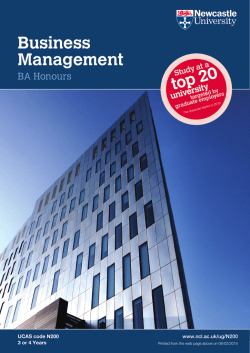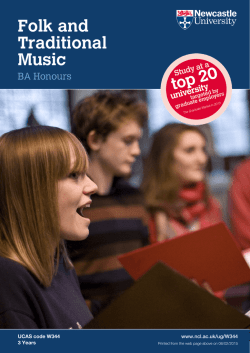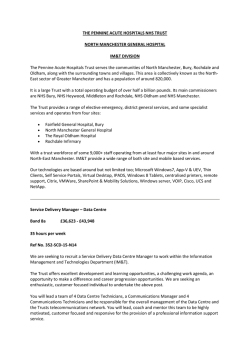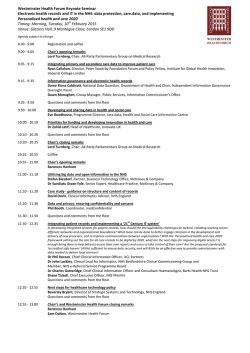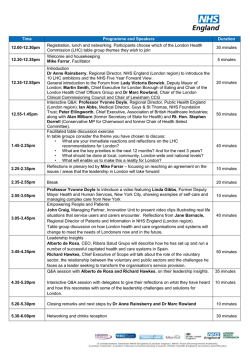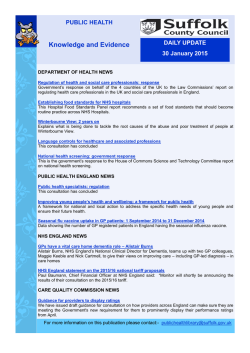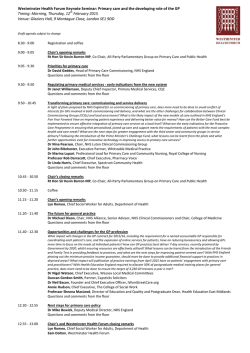
Medicine and Surgery (Accelerated Programme)
Medicine and Surgery (Accelerated Programme) MB BS Honours UCAS code A101 4 Years www.ncl.ac.uk/ug/A101 Printed from the web page above on 06/02/2015 Medicine and Surgery (Accelerated Programme) MB BS Honours UCAS code A101 4 Years This four-year accelerated programme is designed for graduates of any discipline who wish to train as a doctor, and others whose prior professional experience qualifies them for entry. • Professional accreditation Our curriculum is aligned to the General Medical Council (GMC) standards for the knowledge, skills and behaviours of undergraduate medical students and for the delivery of teaching, learning and assessment, as outlined in Tomorrow’s Doctors (2009). Studying Medicine at Newcastle Medicine at Newcastle combines university-based learning and clinical placements in the NHS. We offer a very high quality learning experience and consistently rank as one of the most highly regarded medical degrees in the UK. • As in our five-year programme, there are two Phases of study. However, in our accelerated degree, Phase I spans 45 weeks instead of two years. • During Phase I, you learn through case-led teaching, with clinical cases used to ensure a problem-first, task-based focus. • You are allocated to a small study group, led by a senior medical tutor who provides support and guidance throughout the year. In Phase II, you are integrated into a single common pathway alongside undergraduate students on our five-year course. Medicine at Newcastle is consistently one of the most highly regarded medical degrees in the UK. The excellence of our programmes has been confirmed by the General Medical Council (GMC). Quality and ranking Medicine at Newcastle is consistently one of the most highly regarded medical degrees in the UK. • • • • We rank among the best British universities for medicine in The Times/Sunday Times Good University Guide 2015 and The Complete University Guide 2015. We rank 7th in the UK for overall student satisfaction, with a score of 94% in the National Student Survey 2014 We're ranked 9th overall in the UK for research in the ‘Clinical Medicine’ category (Research Excellence Framework 2014) The excellence of our programmes has been confirmed by the General Medical Council (GMC). We rank in the top 150 universities in the world in the QS World University Rankings by Subject 2014. • • Develop your core knowledge and skills in our well-equipped, city-centre Medical School Work with NHS professionals and patients on clinical placements during Stages 3 and 5 Experience contact with patients from Stage 1 Tailor your degree to your interests with student-selected components and an elective in Stage 4 Take a year of intercalated study to gain another degree in addition to your MB BS (optional) You will develop the key skills of communication, information handling, reasoning, judgement, reflective practice and decision-making. Medical ethics is also a strong theme in the curriculum. Find out more in the Course Content section. Teaching Style Integrated Medicine is taught in different ways by different institutions. Understanding the ways in which you learn best will help you to decide which style of learning will suit your needs. At Newcastle, we use an integrated approach. This means that you develop core knowledge, taught in systems, with early clinical exposure and the acquisition of clinical skills from the beginning of Stage 1. Case-led You receive 'case-led' teaching in your first two years, which means using clinical cases to help you make the links between your new knowledge and clinical practice. You undertake a varied menu of early clinical experience, through contact with patients and visits to general practice and hospitals, giving you a clinical context on which to develop your core knowledge. Take a virtual tour at www.ncl.ac.uk/tour 2 Early clinical experience Course Content We begin teaching clinical skills from as early as week 2 in our Clinical Skills Laboratory. Here, a team of Specialty Trainees provide structured learning and teaching, which includes: Like our five-year MB BS (A100), this accelerated programme is divided into two phases: • • • venesection examination skills CPR, and much more • • Facilities and support Our Medical School at Newcastle is a Regional Medical School and has partnerships with Durham University and the Northern Region NHS. This gives you access to excellent clinical training opportunities offered by the large patient population (3.5 million) and the region-wide infrastructure of acute hospitals and general practices. The degree is delivered by the University's School of Medical Education. Facilities • • • • Extensive specialist medical library Clinical Skills and Anatomy Laboratory Dedicated computer clusters with online study guides that include interactive assessment tools Access to Anatomy and Clinical Skills Centres, in Newcastle and throughout the region, which include patient simulators, dissecting rooms and clinical skills laboratories Support • • Comprehensive network of support including a peer-parenting system, partnering new students with a 'family' of more senior students who can offer advice and support Specialist careers advice from undergraduate level through to foundation training, to help you make the transition from student to doctor Social activities • Very active student society, MedSoc, to help you settle in and meet students from all years on an informal basis Find out more • • Take a virtual tour of the Medical School on the Newcastle University website View videos about the first two years of study, clinical experience, research and the city of Newcastle Phase I spans 45 weeks: your course of study will provide you with an experience separate from, but equivalent to, Phase I of the five-year MB BS course Phase II, which spans three years (Stages 3, 4 and 5). Phase II places further emphasis on personal and professional development, student choice and community-based medicine Phase 1 Spanning 45 weeks, this Phase will provide you with an experience separate from, but equivalent to, Phase I of the five-year MB BS course. Teaching and learning is organised into small study groups and is structured around the Units of Study covered in Phase I of the five-year course. During Phase I students can take up the opportunity to gain additional early clinical experience by selecting from our bank of clinical experiences. Phase 2 You are integrated into a single common pathway alongside students on our five-year course. You spend Stages 3 and 5 in one of four Clinical Base Units in the region. Find out more in the Clinical Placements section, and on the Medicine at Newcastle website. Stage 3 During Stage 3 you undertake an initial introduction to clinical practice and a series of essential junior rotations, which provide you with clinical experience in a range of specialities. The essential junior rotations in Stage 3 are: • • • • • Child health Chronic illness, disability and rehabilitation Infection and clinical practice Mental health Women's health During this time you will also spend a half day each week in general practice. Stage 4 In Stage 4 you undertake the following Units of Study: • • • Clinical pharmacology, therapeutics and prescribing Clinical sciences and investigative medicine Patients, doctors and society You follow this with an 18-week period of Student Selected Components and an eight-week Elective. See the Student-Selected Components section for more information. Take a virtual tour at www.ncl.ac.uk/tour 3 Stage 5 You are based in a different Base Unit from the one you were in during Stage 3. In Stage 5 you undertake a series of senior clinical rotations as below: • • • • • Child health Patients, doctors and society: preparing for practice Primary care Mental health Women's health This is followed by a 16 week block called Hospital-based practice. Clinical placements You spend Stages 3 and 5 in one of four Clinical Base Units in the region. You will be based in a different regional Base Unit in Stages 3 and 5, as we believe that it is important that you experience the wide range of clinical opportunities available throughout the region. These are: Northumbria Base Unit • • Northumbria Healthcare NHS Foundation Trust North Cumbria University Hospitals NHS Trust Tyne Base Unit • • Newcastle Hospitals NHS Trust Queen Elizabeth Hospital Gateshead NHS Trust Wear Base Unit • • • City Hospitals Sunderland NHS Trust South Tyneside NHS Trust University Hospital North Durham University Tees Base Unit • • • South Tees Hospitals NHS Foundation Trust North Tees & Hartlepool NHS Foundation Trust Darlington Memorial Hospital healthcare system. Find out more about outgoing electives on the Medicine at Newcastle website. In Stage 5 your SSC focuses on consolidating your understanding of ethical principles and applying ethical reasoning to a case or problem you have experienced. Intercalated Study Our medical students have the opportunity to enrich their personal and professional development further by taking time out of their medical studies to pursue an intercalated degree. Intercalation provides an opportunity to study a subject that interests and excites you as well as develop new perspectives on healthcare delivery, research and education. We offer a broad range of Biomedical Science BSc degrees and Masters degrees that cover all aspects of medical practice. We encourage you to develop skills that will be useful throughout your future career and offer options to undertake your own research project. Newcastle is recognised as a leader in a number of areas of research including ageing research and applied stem cell biology. We also have state-of-the-art facilities for clinical research, developed in partnership with NHS trusts. Students who do not wish to take an additional year of study will still have opportunities to benefit from our research expertise through Student-Selected Components (SSCs). Find out more about intercalated study on the Medicine at Newcastle website. Find out more about our Clinical Base Units on the Medicine at Newcastle website. On completion of your degree Student-selected components Given the prior experience of entrants to this programme, this strand begins in Stages 4 and 5. In Stage 4 you complete three SSCs, each lasting six weeks. Some examples of student-selected topics available in Stage 4 include: • • • • • • • care of newborn babies neurosurgery medical law complementary medicine tropical diseases accident and emergency medicine and paramedic attachment wilderness and survival medicine These SSCs are followed by an eight-week elective period. This gives you the opportunity to study anywhere in the world and gain hands-on experience of a different You will be eligible for provisional registration with the General Medical Council (GMC). Currently, all UK medical graduates are required to complete a two-year Foundation Programme of general clinical training. Once you have successfully completed the first year you are eligible for full registration with the GMC. The majority of our students decide to apply to Foundation posts within the region. There are sufficient Foundation Programme places in the Northern Region for the majority of medical graduates. Entry Requirements All candidates are considered on an individual basis. If your qualifications are not listed here, please see our additional entry requirements web pages to find out which other qualifications are considered. Take a virtual tour at www.ncl.ac.uk/tour 4 Additional entry information beyond specific grades for this programme is provided under ‘Important Information for All Students' below. Important Information for All Students This course is designed for graduates of any discipline, and for others who have relevant experience which includes a substantial amount of contact with patients gained as an established health care professional within the NHS or equivalent body (eg RGN, RMN, Physiotherapist) with a qualification recognised by a statutory body. Only candidates classed as 'home' students for fees purposes will be eligible to apply for this course. Applicants must have achieved, or expect to achieve, at least an upper second class Honours degree, or integrated Master's degree, or be a practising health care professional with a post-registration qualification. All applicants will be expected to provide evidence of sustained academic endeavour within the last three years - eg A Level study, Open University, GAMSAT - prior to the start of the programme. GCSEs, A Levels and Masters qualifications Please note: A Level and GCSE results for graduate applicants will have no direct bearing on the decision to interview or offer a place. This also applies for Masters qualifications. UKCAT All applicants to the 4 year A101 Medicine programme at Newcastle University will be required to take the UK Clinical Aptitude Test (UKCAT). The UKCAT threshold may differ in each admissions cycle as it is dependent on the scores achieved by those applicants who apply to our Medical School in the current cycle. Therefore information on what the threshold is, is not available to prospective students. Please see the School of Medical Education web page for more information www.ncl.ac.uk/mbbs/admissions. Candidates who are considered, on the basis of their application and UKCAT, to be particularly promising are interviewed. Some evidence of work experience in a healthcare or social care setting would be expected from applicants who do not have prior healthcare experience. • TB Newcastle University follows the Medical Schools Council protocol on blood-borne viruses. During the course students will be requested to be tested for Hepatitis B; Hepatitis C and HIV. All aspects of a student’s medical record will be bound by the same duty of confidentiality as for any doctor-patient interaction and informed by the same ethical guidance. The status of any individual in respect of blood-borne viruses will not be a factor in the admissions selection process and will not prevent them completing medical training. For further information see MSC Guidance. Disclosure and Barring Service (DBS) checks All medical schools are required to ensure that their students, who will have a high level of unsupervised contact with children or vulnerable adults, undergo a Disclosure and Barring Service (DBS) enhanced check to ensure students are 'fit to practise'. The Medical School reserves the right to discontinue your studies on receipt of an unsatisfactory disclosure. The University is aware that the Independent Safeguarding Authority requirement has been halted and is presently under review by the government. This position may change at any time, please see the Disclosure and Barring Service for updates. For more information Detailed information can be found in the MBBS Admissions Policy on the admissions page of the Medical School website. English Language Requirements For this degree you will need a minimum score of IELTS 7.0 or equivalent. Visit our International Students web pages to find out more about our English language admission requirements. If you need to improve your English language skills before you enter this course, our partner, INTO Newcastle, offers a range of English language courses. These intensive and flexible courses are designed to improve your English ability for entry to this degree. Find out more: English for University Study Health Assessment and Disclosure Pre-sessional English All students are required to comply with the Department of Health’s guidance on health clearance for healthcare workers. Early clinical contact at Newcastle means that students will be asked to provide proof of their immunisation status on entry. Undergraduate Admissions Policy • Newcastle University Undergraduate Admissions Policy 2015 Entry (PDF: 109 KB) See further Newcastle University Admissions Policies. Please note: Immunity against the following is required: • • • • • • • Polio Tetanus Varicella (Chicken Pox) Diphtheria Measles Mumps Rubella Medicine and Surgery careers After completing your University degree, you are entitled to provisional registration with the GMC with a licence to practise, subject to demonstrating to the GMC that your fitness to practise is not impaired. Once you have successfully completed a year as an F1 doctor in a two-year Foundation Programme you should Take a virtual tour at www.ncl.ac.uk/tour 5 gain full registration. This is followed by a further year of generic training. On successful completion of your second year, all doctors will have achieved the same basic competencies before going on to select their speciality of choice (www.mmc.nhs.uk), either as a doctor in hospitals, or as a GP. All doctors, regardless of their speciality, must continue learning throughout their career, and our degree has been designed with this long-term aim in mind. Find out more about the career options for Medicine and Surgery from Prospects: The UK's Official Careers Website. Tuition Fees (International students) This programme is not open to international applicants. Scholarships and Financial Support (UK and EU students) You may be eligible for one of a range of Newcastle University Scholarships in addition to government grants and support. 2014 entry: Sports Scholarships Subject Scholarships Careers and employability at Newcastle Newcastle University consistently has one of the best records for graduate employment in the UK. • • 93.7% of our 2013 UK/EU graduates progressed to employment or further study within six months of graduating. More than three quarters (77%) of our graduates who entered employment achieved a graduate-level position. Living cost loan & Supplementary Grants Scholarships and Financial Support (International students) This programme is not open to international applicants. We provide an extensive range of opportunities to all students through an initiative called ncl+ which enables you to develop personal, employability and enterprise skills and to give you the edge in the employment market after you graduate. Our award-winning Careers Service is one of the largest and best in the country, and we have strong links with employers. Finance Tuition Fees (UK and EU students) 2015 entry: Year 1 - £9,000 (£5,535 of the £9,000 fee will be available as a loan from the Student Loans Company. Students will need to self-finance the fee balance of £3,465). Northern Stage on campus opposite the Students' Union. Years 2, 3 and 4 - £9,000 per year. £3,465 of the tuition fees will be funded by the NHS and the balance of the £9,000 fee (£5,535) will be available as a loan from the Student Loans Company. Eligible students may also apply for a means-tested NHS Bursary. See more information. Students from Scotland, Wales and Northern Ireland should seek advice about financial support from their own funding authorities. See more information on all aspects of student finance relating to Newcastle University. Please note that the tuition fee amount you will pay may increase slightly year on year in line with inflation and subject to government regulations. Take a virtual tour at www.ncl.ac.uk/tour 6
© Copyright 2026

